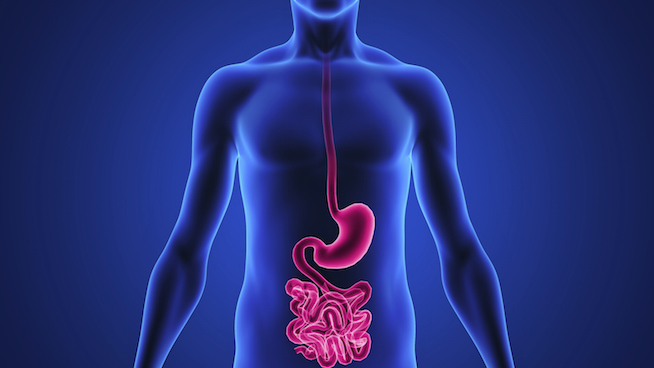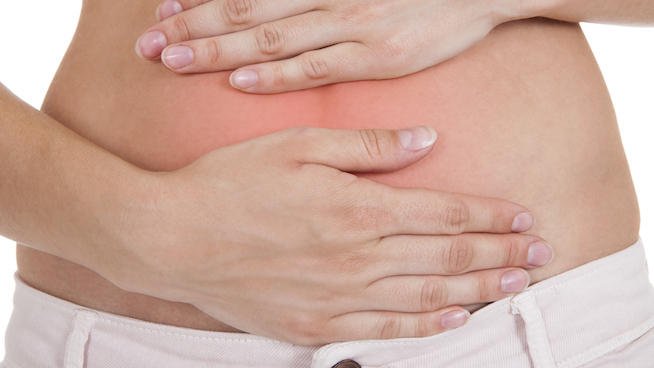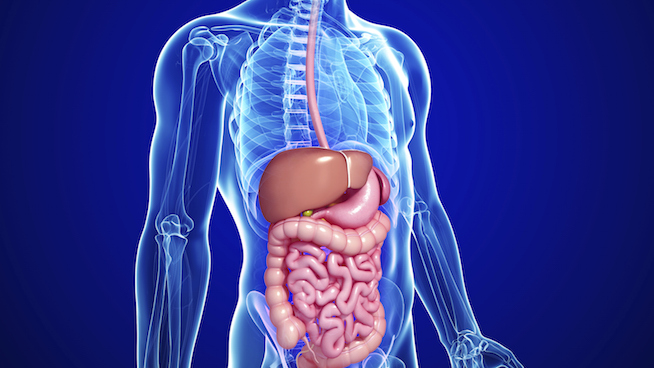Your Gut Might Be the Most Important Part of Your Body
The word “gut” gets a bad rap. To many people, a gut has become synonymous with the pot belly one develops from too much pizza and too little exercise. But a medical dictionary defines the gut as “part of the alimentary canal and especially the intestine or stomach.” The alimentary canal is essentially the route the food we eat follows from consumption to elimination. It includes the mouth, pharynx, esophagus, stomach and large and small intestines.
Everybody has a gut. Some hide it behind a beer belly and others store it under a six-pack. The gut has been linked to a surprisingly large number of health outcomes in recent years, and a growing amount of research is concluding that the bacteria in the gut is the reason why. The bacteria—and the balance of bacteria—seem to affect much more than digestion, and lifestyle habits have a big impact on them.
STACK talked with Kristin Kirkpatrick, registered dietician and wellness manager for the Cleveland Clinic, and Ryan Andrews, a coach at Precision Nutrition, to find out why the gut might be the most important part of the body and how we can better take care of it.
The Gut Microbiome

Like the word gut, the word “bacteria” carries negative connotations. For many people, it conjures up visions of virus, sickness and disease. But the truth is that our bodies need bacteria. Humans are covered inside and out with trillions of bacteria. Most of it lies within our gut in what is known as the “gut microbiome,” which consists of yeasts, fungi and roughly 3 to 4 pounds of bacteria!
More than 5,000 species of bacteria live in the gut. Some are helpful, some are harmful and many are ambiguous. Most have long names, like “methanobreviabcater smithii” or “bifidobacterium longum,” and they serve a wide range of purposes.
“The bacteria that reside in the gut are very diverse and are involved in actions such as supplying essential nutrients, synthesizing vital vitamins, digesting cellulose, promoting nerve function and destroying toxins,” says Kirkpatrick.
The exact actions and purpose of many bacteria are still a mystery, but projects like the National Institute of Health’s Human Microbiome Project are spending massive amounts of time and money to better understand bacteria within the body and to “look for correlations between changes in the microbiome and human health.”
Generally speaking, the more diverse a person’s microbiome, the better. Lean, healthy people have more diverse bacteria in their gut than obese, unhealthy people, and the average American gut is less diverse than that of people in other countries with healthier populations. In most cases, a diverse gut equals a healthy gut, one that’s adept at keeping the body running optimally.
What Does the Microbiome Affect?

The big reason why gut health has become a hot topic lately is because it’s been linked to a large number of health aspects. Gut health has been connected to physical and mental health in a number of ways. “The bacteria in the gut is directly linked to an individual’s immune system, brain and weight,” Kirkpatrick says.
This is surprising to many people who associate gut health only with ailments that can be cured with Pepto-Bismol.
“Most people think that a problem in the gut is localized,” Andrews says. “Like if you get food poisoning, you’ll get some diarrhea and that’s it, end of story. But a compromised gut can have effects all throughout your body.”
Thus far, studies have connected the gut microbiome to autism, diabetes, obesity, cancer, IBS, arthritis, Parkinson’s disease, allergies, inflammation, acne and more.
Gut bacteria can even affect emotions and temperament. One study took gut bacteria from an adventurous, exploratory species of mice and implanted it into a shy, timid species. The result? The shy mice suddenly became more bold and adventurous. And when gut bacteria was taken from the shy mice and implanted into the adventurous mice, they suddenly became more shy and hesitant in their behavior.
So how does gut bacteria affect such a wide range of health issues? That’s the big question researchers are still trying to answer, but there’s a belief that something called “leaky gut syndrome” could be a main reason. A “leaky gut” occurs when the gut wall gets irritated or inflamed and loses its selective permeability.
A healthy gut allows only specific beneficial things—like vitamins and amino acids—to escape through the gut wall and into the bloodstream. A leaky gut loses this ability, often letting harmful things escape from the gut and enter the bloodstream. “When something compromises the gut lining, the defense of the wall is compromised,” Andrews says. “Harmful bacteria can escape into your systemic circulation. So these are going from your gut into your blood and lymphatic system and organs.”
Things like undigested food particles, toxins and microbes can leave the gut, enter the bloodstream and spread throughout the body, throwing your immune system out of whack and potentially leading to one or more of the issues mentioned above, including cancer.
How Can You Improve Gut Health?

The process of populating your gut begins at birth, since we all come into the world with essentially a clean slate in our gut. As soon as you’re born, the environments you’re exposed to, the foods you eat and your own genetics all play roles in determining what bacteria are in your gut. The bacteria within your body is constantly changing, so dietary alterations and environmental changes can make a difference in your gut health no matter how old you are. Poor diet and overuse of antibiotics are two main causes of poor gut health.
“The typical “Western diet” is shown to produce inflammatory responses in the gut and alter the composition of bacteria in the gut. It’s high in refined grains, sugar and artificial sweeteners, low in fruits and vegetables, and the portions are often massive,” Kirkpatrick says.
It’s believed the typical American diet, which is high in processed foods, meats, fat and sugar, wreaks havoc on gut health and results in low bacteria diversity.
So what foods should you eat? Plant fibers and complex carbohydrates are a good place to start. These are the preferred sources of fuel the bacteria in your gut like to munch on, and they help prevent inflammation and gut wall damage. Eating a wide variety of produce, whole grains and unprocessed or minimally processed foods creates a good environment for gut health. “Try to eat more whole foods, things that the gut has longstanding relationships with,” Andrews says.
You can also eat more foods that are rich in probiotics.
“Probiotics are live microorganisms that beneficially affect your gut by selectively stimulating the growth or activity of a limited number of healthy bacteria in the colon,” Kirkpatrick says. “Getting more good bugs in there via probiotics can help benefit overall health.”
The two most common probiotics found in commercial foods are bifidobacteria and lactobacilli, which have been found to increase the amount of butyrate (good gut bacteria), while other gut bacteria remain unchanged. Some common foods that include probiotics are sauerkraut, yogurt, kefir, kimchi, pickles and raw vinegar.
On the flip side, antibiotics wipe out bacteria in the gut. It’s often assumed that antibiotics attack just harmful bacteria, but they actually eliminate both good and bad bacteria. That means taking antibiotics too often can open the door to gut health issues. Antibiotics are an extremely valuable healthcare tool, but overdoing them can create an unhealthy gut environment. Antibiotics don’t only come in pill form, though—they’re in food products, as well. Seeking out foods such as chicken or beef that are free of antibiotics is another step you can take toward building and maintaining a healthy gut.
RELATED: The Best Foods for Digestive Health
RECOMMENDED FOR YOU
MOST POPULAR
Your Gut Might Be the Most Important Part of Your Body
The word “gut” gets a bad rap. To many people, a gut has become synonymous with the pot belly one develops from too much pizza and too little exercise. But a medical dictionary defines the gut as “part of the alimentary canal and especially the intestine or stomach.” The alimentary canal is essentially the route the food we eat follows from consumption to elimination. It includes the mouth, pharynx, esophagus, stomach and large and small intestines.
Everybody has a gut. Some hide it behind a beer belly and others store it under a six-pack. The gut has been linked to a surprisingly large number of health outcomes in recent years, and a growing amount of research is concluding that the bacteria in the gut is the reason why. The bacteria—and the balance of bacteria—seem to affect much more than digestion, and lifestyle habits have a big impact on them.
STACK talked with Kristin Kirkpatrick, registered dietician and wellness manager for the Cleveland Clinic, and Ryan Andrews, a coach at Precision Nutrition, to find out why the gut might be the most important part of the body and how we can better take care of it.
The Gut Microbiome

Like the word gut, the word “bacteria” carries negative connotations. For many people, it conjures up visions of virus, sickness and disease. But the truth is that our bodies need bacteria. Humans are covered inside and out with trillions of bacteria. Most of it lies within our gut in what is known as the “gut microbiome,” which consists of yeasts, fungi and roughly 3 to 4 pounds of bacteria!
More than 5,000 species of bacteria live in the gut. Some are helpful, some are harmful and many are ambiguous. Most have long names, like “methanobreviabcater smithii” or “bifidobacterium longum,” and they serve a wide range of purposes.
“The bacteria that reside in the gut are very diverse and are involved in actions such as supplying essential nutrients, synthesizing vital vitamins, digesting cellulose, promoting nerve function and destroying toxins,” says Kirkpatrick.
The exact actions and purpose of many bacteria are still a mystery, but projects like the National Institute of Health’s Human Microbiome Project are spending massive amounts of time and money to better understand bacteria within the body and to “look for correlations between changes in the microbiome and human health.”
Generally speaking, the more diverse a person’s microbiome, the better. Lean, healthy people have more diverse bacteria in their gut than obese, unhealthy people, and the average American gut is less diverse than that of people in other countries with healthier populations. In most cases, a diverse gut equals a healthy gut, one that’s adept at keeping the body running optimally.
What Does the Microbiome Affect?

The big reason why gut health has become a hot topic lately is because it’s been linked to a large number of health aspects. Gut health has been connected to physical and mental health in a number of ways. “The bacteria in the gut is directly linked to an individual’s immune system, brain and weight,” Kirkpatrick says.
This is surprising to many people who associate gut health only with ailments that can be cured with Pepto-Bismol.
“Most people think that a problem in the gut is localized,” Andrews says. “Like if you get food poisoning, you’ll get some diarrhea and that’s it, end of story. But a compromised gut can have effects all throughout your body.”
Thus far, studies have connected the gut microbiome to autism, diabetes, obesity, cancer, IBS, arthritis, Parkinson’s disease, allergies, inflammation, acne and more.
Gut bacteria can even affect emotions and temperament. One study took gut bacteria from an adventurous, exploratory species of mice and implanted it into a shy, timid species. The result? The shy mice suddenly became more bold and adventurous. And when gut bacteria was taken from the shy mice and implanted into the adventurous mice, they suddenly became more shy and hesitant in their behavior.
So how does gut bacteria affect such a wide range of health issues? That’s the big question researchers are still trying to answer, but there’s a belief that something called “leaky gut syndrome” could be a main reason. A “leaky gut” occurs when the gut wall gets irritated or inflamed and loses its selective permeability.
A healthy gut allows only specific beneficial things—like vitamins and amino acids—to escape through the gut wall and into the bloodstream. A leaky gut loses this ability, often letting harmful things escape from the gut and enter the bloodstream. “When something compromises the gut lining, the defense of the wall is compromised,” Andrews says. “Harmful bacteria can escape into your systemic circulation. So these are going from your gut into your blood and lymphatic system and organs.”
Things like undigested food particles, toxins and microbes can leave the gut, enter the bloodstream and spread throughout the body, throwing your immune system out of whack and potentially leading to one or more of the issues mentioned above, including cancer.
How Can You Improve Gut Health?

The process of populating your gut begins at birth, since we all come into the world with essentially a clean slate in our gut. As soon as you’re born, the environments you’re exposed to, the foods you eat and your own genetics all play roles in determining what bacteria are in your gut. The bacteria within your body is constantly changing, so dietary alterations and environmental changes can make a difference in your gut health no matter how old you are. Poor diet and overuse of antibiotics are two main causes of poor gut health.
“The typical “Western diet” is shown to produce inflammatory responses in the gut and alter the composition of bacteria in the gut. It’s high in refined grains, sugar and artificial sweeteners, low in fruits and vegetables, and the portions are often massive,” Kirkpatrick says.
It’s believed the typical American diet, which is high in processed foods, meats, fat and sugar, wreaks havoc on gut health and results in low bacteria diversity.
So what foods should you eat? Plant fibers and complex carbohydrates are a good place to start. These are the preferred sources of fuel the bacteria in your gut like to munch on, and they help prevent inflammation and gut wall damage. Eating a wide variety of produce, whole grains and unprocessed or minimally processed foods creates a good environment for gut health. “Try to eat more whole foods, things that the gut has longstanding relationships with,” Andrews says.
You can also eat more foods that are rich in probiotics.
“Probiotics are live microorganisms that beneficially affect your gut by selectively stimulating the growth or activity of a limited number of healthy bacteria in the colon,” Kirkpatrick says. “Getting more good bugs in there via probiotics can help benefit overall health.”
The two most common probiotics found in commercial foods are bifidobacteria and lactobacilli, which have been found to increase the amount of butyrate (good gut bacteria), while other gut bacteria remain unchanged. Some common foods that include probiotics are sauerkraut, yogurt, kefir, kimchi, pickles and raw vinegar.
On the flip side, antibiotics wipe out bacteria in the gut. It’s often assumed that antibiotics attack just harmful bacteria, but they actually eliminate both good and bad bacteria. That means taking antibiotics too often can open the door to gut health issues. Antibiotics are an extremely valuable healthcare tool, but overdoing them can create an unhealthy gut environment. Antibiotics don’t only come in pill form, though—they’re in food products, as well. Seeking out foods such as chicken or beef that are free of antibiotics is another step you can take toward building and maintaining a healthy gut.
RELATED: The Best Foods for Digestive Health











